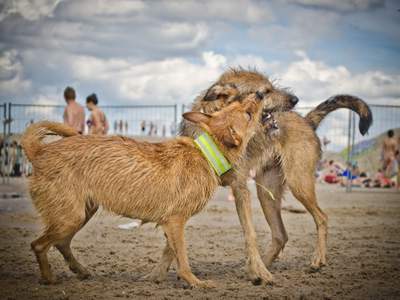Biting is a natural behaviour among puppies when playing. Through such a rough form of play, they learn inhibition, coordination, and self-control. You should not tolerate your puppy bitting or nipping people even if it is in a playful way.
Why puppies bite?
Most probably your puppy bites you in order to attract attention, initiate play or forgets to control himself during the play time. The frequency of biting usually spikes after food intake, as the puppy has a lot of excess energy. One way to prevent the behaviour is to incorporate feeding with training or play, use food as a reward. After a few activities, your puppy will be tired and most likely choose to nap.
What to do?
Does your dog still bite you? Immediately he does, you should stand up, turn away and discontinue any contact with the dog. Do not talk to him. The puppy should learn that biting you results in no interaction. Once the puppy calm downs, praise him.
To help your puppy control its biting behaviour, you can also give it plenty of chew toys to play with. Choose toys that are soft and pliable, and can be easily chewed without breaking apart. This will help satisfy your puppy’s urge to chew and bite, while also promoting healthy teeth and gums. Make sure to supervise your puppy’s playtime with toys, and replace any toys that become damaged or broken.
There is a myth that if the puppy is biting, you should take a toy in the hand and continue playing using the toy. But this only teaches the Dog bite=play. Also, do not talk or pay any attention to your puppy until they calm down. When the puppy settles down and waits, stops jumping, praise and start playing again.
Don’t be rough to your dog, this will only show that you encourage rougher behaviour. Or if you accidentally hurt the puppy, make him scared of you.
Another way to discourage biting behaviour is to train your puppy to respond to a command such as “no bite” or “stop.” Whenever your puppy starts to bite or nip at you, use the command in a firm but calm voice. If your puppy stops biting, immediately praise it and offer a treat as a reward. Over time, your puppy will learn to associate the command with stopping the biting behaviour.
If you react only to stronger bites, the puppy will learn to bite you harder to get attention.
Do not forget to schedule short 3-5 sessions of play or complete Dogo daily training. You should initiate the sessions yourself and when the puppy is calm. If you remember that your dog needs attention only when he whines or bites you this would teach him, that being loud pays off. Next time he will try to attract your attention even louder and more persistently.
It’s important to remember that consistency is key when it comes to training your puppy not to bite. Make sure that everyone in your household is on the same page when it comes to responding to your puppy’s biting behaviour. If some members of your household allow the puppy to bite or play rough, it will be harder to train the puppy to stop biting altogether. Additionally, be patient with your puppy and don’t expect the behaviour to change overnight. With consistent training and positive reinforcement, your puppy will eventually learn to control its biting impulses.
Conclusion: Calm behaviour is rewarded, Biting makes you leave.
Dogo – train your dog at home
iOS App: Dogo – Your Dog’s Favorite App
Android App: Dogo – Your Dog’s Favourite Training App




